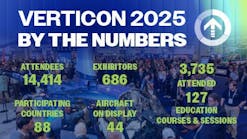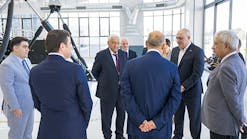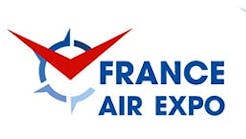HAI Issues Call to Action on VA Flight Training
HAI President Matt Zuccaro has issued a "Call to Action" to all U.S. members on an issue critical to the future of the industry: helicopter flight training for military veterans.
There is a move underway in Congress — and has been for some time now — that would cap the annual dollar amount for GI Bill flight-training benefits. And now the House Committee on Veterans’ Affairs and the U.S. Department of Veterans Affairs (VA) are working in tandem to severely curb the educational benefits available to veterans for commercial pilot training.
Time is of the essence. Detrimental legislation could be attached to the omnibus spending bill moving through the House and Senate this week that would severely limit VA flight-training benefits. Contact your representative and senators today.
The VA will no longer reimburse veterans for private pilot training — the first rung on the ladder to a career as a pilot — even if it is being offered through an institute of higher learning (IHL). The additional financial strain of $20,000+ in cost burdens placed on our veterans means fewer and fewer will be able to pursue a commercial helicopter pilot career.
Whether you are currently enrolled in flight training, a seasoned commercial helicopter pilot, or the owner/operator of a commercial helicopter operation, this is an issue that will most certainly have long-term effects on you and our entire industry. We strongly encourage you to weigh in with your elected officials in the House and Senate to make sure your voice — and the entire industry’s — is heard loud and clear on Capitol Hill.
The House Committee on Veterans’ Affairs has filed its committee report and introduced H.R. 3016. Section 306 of this bill would cap payments for tuition and fees for educational programs at public IHLs that involve flight training, applying the same limit for private institutions to all flight-training programs ($19,400/year). Students who are enrolled in flight-training programs before enactment of H.R. 3016 would not see their education benefits reduced for two years, and payments for students whose tuition is below the new cap would not be affected.
At the same time that the legislation is pending, the VA issued a determination on Dec. 4 regarding private-pilot courses under IHL degree programs provided by flight schools under contracts to an IHL:
- Effective immediately, elective credits and charges for courses involving contracted private pilot training may not be certified. Veterans taking courses at institutions with flight courses that are part of a degree program may only utilize benefits for those courses so long as those courses are not contracted through a vocational flight school.
- Officials may continue to certify credits and/or charges for courses involving contracted private-pilot training that began during the current academic year — but only if the course is required for degree program completion.
- IHLs with affected programs are required to amend curricula to meet compliance with GI Bill approval requirements before the start of the academic year beginning Aug. 1, 2016. They can bring private-pilot instruction in house, contract with an IHL that has its own approved in house program, and/or remove private-pilot courses from program curricula and make possession of a private pilot’s license a requirement for admission into the program
Their motive is to save money. However, according to the Congressional Budget Office, the savings envisioned by not only the congressional committee spearheading this legislation, but also the VA, cannot be realized.
So with no real savings, we will instead see:
- Veterans will be significantly harmed by these cuts, and in turn, the commercial helicopter pilot shortage will worsen as the available pool of helicopter pilots continues to shrink.
- Caps on flight-training benefits for veterans deprives them of the ability to pursue collegiate flight training, a common path to a career as a commercial helicopter pilot. Helicopter flight training is complex and very expensive because of the high costs associated with operating a rotorcraft.
- Requiring veterans to cover the costs associated with their private-pilot license is a discriminatory financial burden the majority of veterans can ill afford.
Pick up the phone and call Washington or email your elected House or Senate members today and voice your concern over this injustice. Contact information for your elected representatives may be found at www.house.gov and www.senate.gov.




